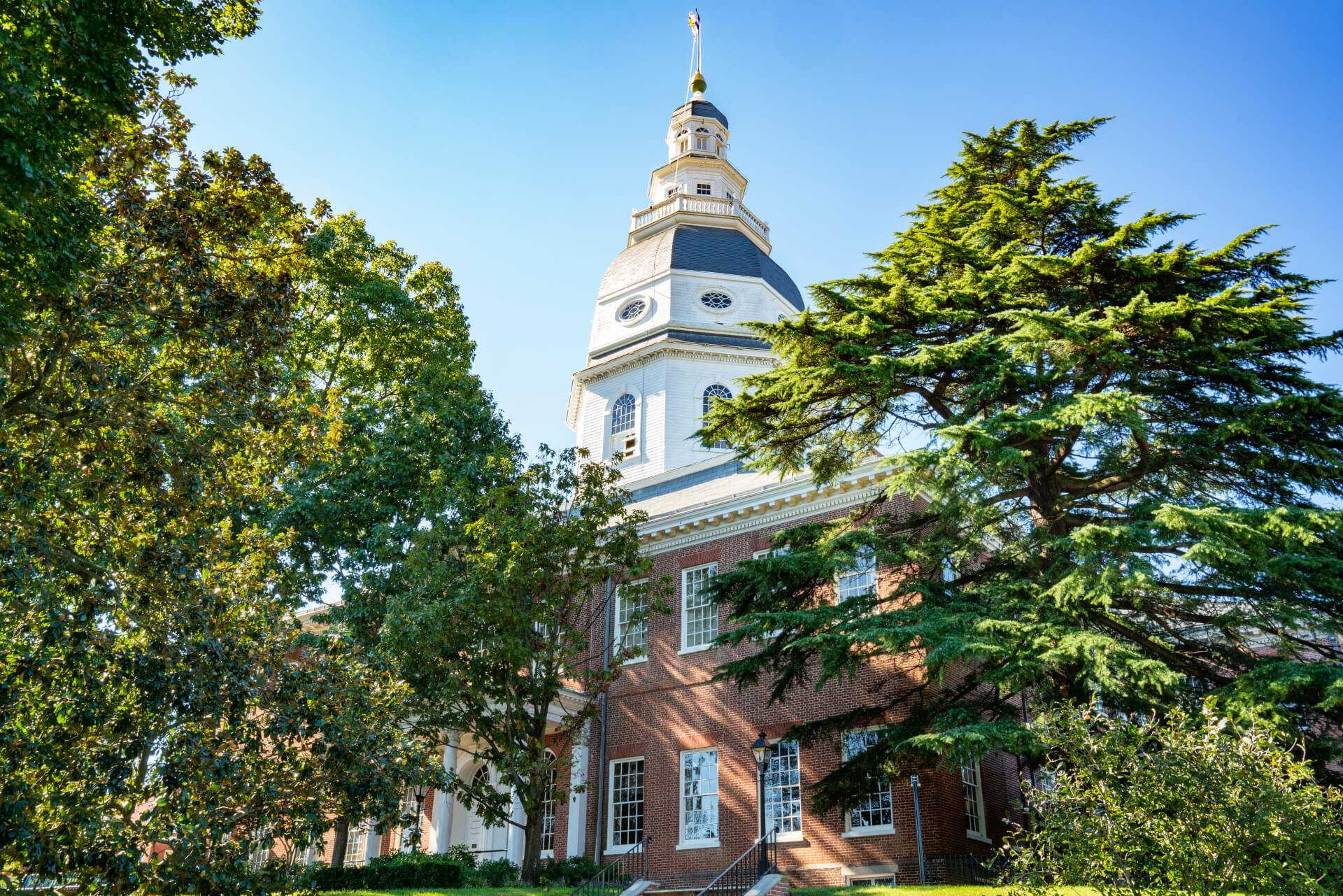Md. LCV Finds Hogan an Inconsistent Leader, Praises Lawmakers on Environmental Justice, Transportation

As Gov. Lawrence J. Hogan Jr. (R) approaches his last year in office, the Maryland League Conservation of Voters assessed his environmental record since 2015 and found inconsistent environmental leadership. Lawmakers in both chambers of the General Assembly received high scores in LCV’s latest annual report card.
Although the Hogan administration took some positive actions on environmental matters, such as endorsing higher greenhouse gas reduction goals and offshore wind, the governor’s “inability or reluctance to take concerted, strategic action to respond to the climate crisis far outweighs its accomplishments,” according to the report.
With over 3,000 miles of shoreline and 265,000 acres of land less than five feet above sea level rise, Maryland is especially at risk to climate change, Kim Coble, the executive director of the Maryland LCV, said during a news conference Thursday. Hogan has failed to staff environmental compliance officers, which is an important task for the governor since it is outside of the legislature’s control, she continued.
The Maryland LCV is a legislative watchdog and advocacy group in Annapolis, keeping track of officials’ support for environmental policies through annual scorecards, a tabulation of legislative victories and defeats for the environmental community and a celebration of the movement’s most faithful allies in the legislature. Elected officials were graded on energy policy, transportation, environmental justice and land and water protection.
Hogan’s best score was a B-minus on energy policy, as he signed a bill that set new targets for the Greenhouse Gas Reduction Act, a landmark measure that required Maryland to slash greenhouse gas emissions to 25% below 2006 levels by 2020. The new target is to cut emissions to 40% below 2006 levels by 2030. He also voted against the construction of the Potomac Pipeline in 2019, which effectively delayed the project — a move that is now being challenged in court.
Hogan earned a D in transportation, as he cancelled Baltimore’s long-planned Red Line, which aimed to transform Baltimore’s light rail and subway network. The report also rebuked Hogan for prioritizing highway expansion over public transit and for vetoing the Transit Safety and Investment Act, which would dramatically boost spending on the state’s existing bus and rail system.
The report praised Hogan for consistently funding the Bay Restoration Fund and Program Open Space, which aims to accelerate park acquisition and preserve environmentally sensitive land.
Hogan earned a D in environmental justice, partly due to what the LCV described as his weak regulations and enforcement on ammonia emissions from poultry farms. Last month, an environmental watchdog group found that 84% of poultry farms in Maryland failed their first state inspection over the last several years — most due to inadequate waste management and failure to keep records — but the state rarely penalized them for their violations.
Environmental justice refers to the idea that no population, regardless of race, national origin or income, should bear a disproportionate share of negative environmental consequences.
“The chronic understaffing of enforcement actions within agencies — we feel is a direct comment about environmental justice priorities and perpetuates the structural disparities of pollution impacts on low-wealth communities and communities of color,” Coble said.
And combating climate change is a challenge that requires cooperation between the executive branch and the General Assembly, Coble said.
Earlier this week, Hogan announced Maryland was the first state in the country to become a partner in the U.S. Department of Energy’s Better Climate Challenge, which commits the state to reduce greenhouse gas emissions in state government operations by at least 50% within 10 years.
“Our administration continues to set an example by identifying energy efficiency opportunities to reduce greenhouse gas emissions from our state buildings,” Hogan said in a statement. “Maryland has one of the nation’s most comprehensive, detailed, and balanced plans to address and mitigate climate change, and this partnership only strengthens our efforts.”
The state is already a partner to DOE’s Better Building Challenge, in which the Maryland Department of General Services works to meet energy consumption reduction goals in government buildings.
Lawmakers with perfect scores
The report lauded the General Assembly for passing the Transit Safety and Investment Act and for a measure that requires the Maryland Public Service Commission, which regulates the state’s gas, electric and water utilities, to consider climate and labor impacts when making decisions.
Lawmakers who received perfect scores based on their votes on environmental legislation during the 2021 session are: Sens. Katie Fry Hester (D-Howard), Clarence K. Lam (D-Howard), Paul G. Pinsky (D-Prince George’s), Sarah K. Elfreth (D-Anne Arundel), Mary L. Washington (D-Baltimore City) and Christopher R. West (R-Baltimore County), and Dels. Sara Love (D-Montgomery), Alfred C. Carr Jr. (D-Montgomery), Emily Shetty (D-Montgomery), Jared Solomon (D-Montgomery), David Moon (D-Montgomery), Jheanelle Wilkins (D-Montgomery), Mary Lehman (D-Prince George’s), Erik L. Barron (D-Prince George’s), Gabriel Acevero (D-Montgomery) and Catherine Forbes (D-Baltimore County).
Barron has since resigned from the legislature to become U.S. attorney for Maryland.
The biggest disappointment of the legislature this year, according to the LCV, was failing to pass the Climate Solutions Now bill, a wide-ranging climate bill that would have raised the greenhouse gas reduction target, electrified the state government’s vehicle fleet and changed building standards to be more energy efficient.
Last session, senators called for a greater greenhouse gas reduction goal — 60% from 2006 levels by 2030 — energy-efficient building codes and net-zero school buildings, while House lawmakers scaled back the greenhouse gas reduction goal, altered the green construction provisions and changed the funding streams, contending that the Senate version was unrealistic and hurt poor people. Lawmakers reached an impasse on Sine Die, rendering the bill dead.
“Without a doubt, the legislature’s most notable failure was its inability to, once again, for the second year in a row, successfully pass comprehensive climate legislation,” Coble said. This contributed to the General Assembly’s lowest score of D in energy policy.
Coble highlighted the General Assembly taking steps towards advancing environmental justice by reinvigorating the state’s Commission on Environmental Justice and Sustainable Communities, which is supposed to advise state agencies on environmental justice issues, to assess how current state laws address environmental inequities and to develop criteria to determine which communities may be disproportionately hit by environmental degradation.
The commission had received criticism for failing to influence any meaningful policies or to engage with communities beset by environmental injustices.
But lawmakers missed an opportunity to give environmental justice commission teeth and power, Coble said. Overall, the General Assembly received a B on environmental justice.
On land and water protection, Coble praised the bipartisan passage of a bill that requires the Maryland Department of the Environment to update stormwater management regulations every five years, as well as the Tree Solutions Now bill, which calls on the state to plant 5 million new trees over the next decade. However, Coble pointed out the Senate’s failure to pass a measure that would ban plastic bags statewide.
Coble encouraged the next gubernatorial administration to prioritize mitigating climate impacts by establishing a “cabinet level climate office” and consistently funding climate initiatives. She also urged the General Assembly to prioritize legislation lowering greenhouse gas emissions from the building and the transportation sectors to be able to reach net zero emissions of carbon dioxide by 2040, while keeping environmental justice concerns “front and center.”
“With a climate reckoning upon us and our communities suffering, Maryland needs to act now to reposition itself as a national leader in equitable climate solution,” Coble said.




 Creative Commons Attribution
Creative Commons Attribution